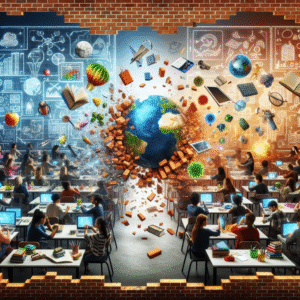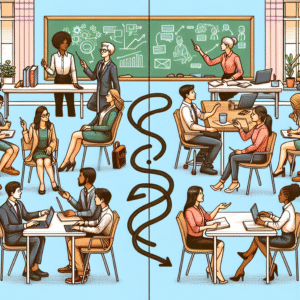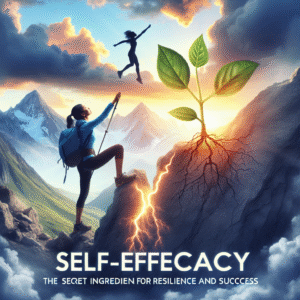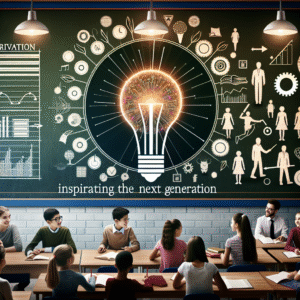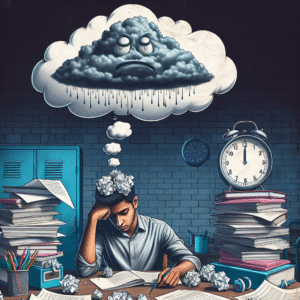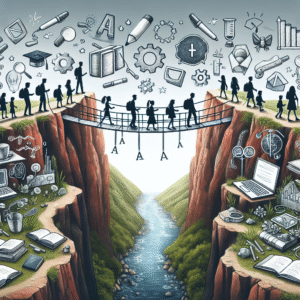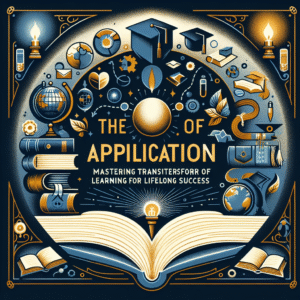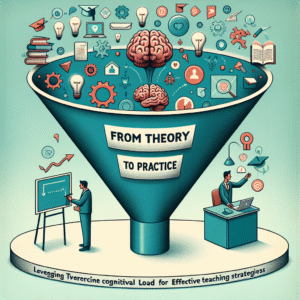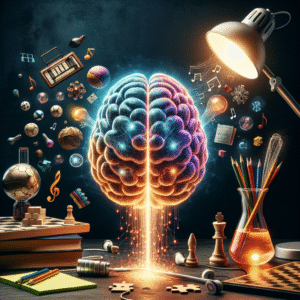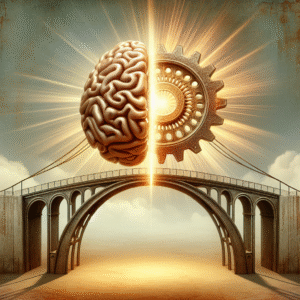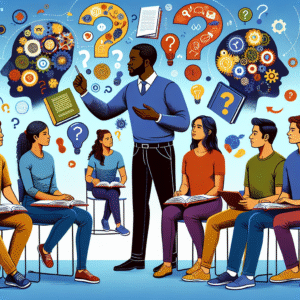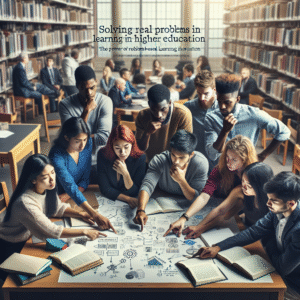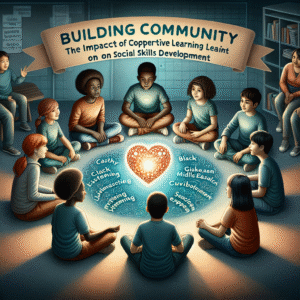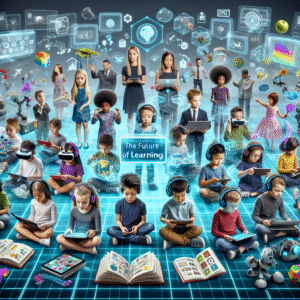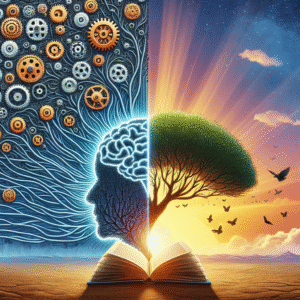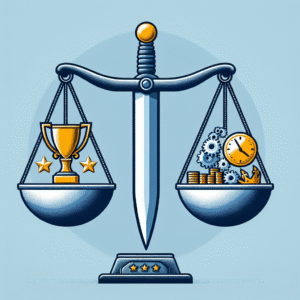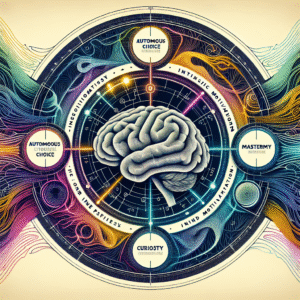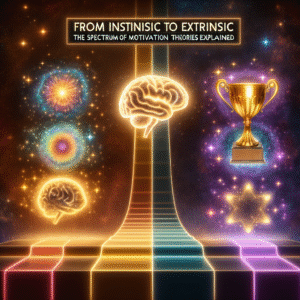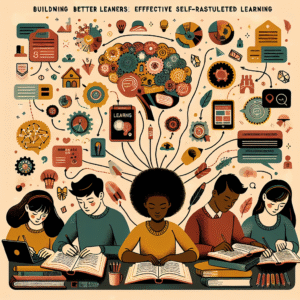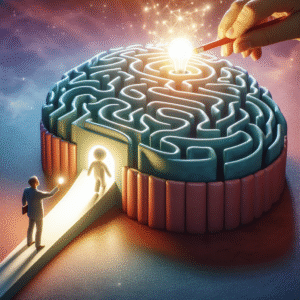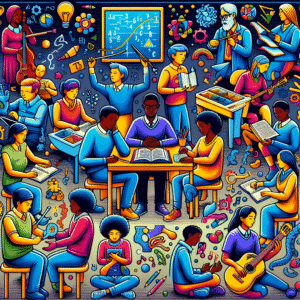Introduction Have you ever watched a child struggle through a task that felt just out of reach, only to see them light up when someone offers the right clue, guiding them toward understanding? This moment captures the essence of the Zone of Proximal Development (ZPD)—a concept developed by psychologist Lev Vygotsky that has profound implications for personalized learning. In...
Educational Psychology
Educational Psychology
Introduction Navigating childhood can be one of the most rewarding yet perplexing journeys in life. As parents, educators, or guardians, understanding the intricate developmental phases that children go through is crucial. If we aim to nurture their growth effectively, we must embrace the concepts introduced by Swiss psychologist Jean Piaget, who revolutionized our understanding of children’s cognitive development. In...
Introduction: The Significance of Our Surroundings Imagine a child growing up in a bustling city, surrounded by diverse cultures, languages, and experiences. In contrast, think about a child in a quiet rural town, where routine and tradition prevail. These environments dramatically influence their behaviors, beliefs, and interactions. The role of environment in shaping behavior: insights from social learning theory...
Introduction In a world bursting with psychological theories, where do we find the threads that connect us to our understanding of human behavior? Enter behaviorism—a psychological model that has persisted and evolved over decades, shaping practices in education, therapy, and even marketing. The relevance of behaviorism today cannot be overstated; it serves not only as a foundational theory in...
Introduction In today’s dynamic educational landscape, the phrase "The Role of Collaboration in Constructivist Learning: Fostering a Community of Learners" resonates with urgency and importance. We live in a world where information is at our fingertips, but the ability to collaborate effectively can determine how well we understand and apply that information. Collaboration isn’t just an add-on; it’s an...
Introduction Imagine a classroom where children aren’t sitting quietly at their desks, but instead, they’re immersed in a world of creativity, collaboration, and joy. This isn’t a fantastical dream; it’s the reality enabled by play-based learning theories. The Power of Play: Exploring the Role of Play-Based Learning Theories reveals not just the importance of play in education, but also...
Introduction In the fast-paced, digitally dominated world we live in today, the significance of play in child development is often overshadowed by academic pressures and screen time. However, engaging in play—especially through structured activities—has shown to be crucial for fostering cognitive development in children. The phrase “The Power of Play: Encouraging Cognitive Development Through Structured Activities” encapsulates the essence...
Introduction In an era where mental health challenges among students are at an all-time high, the need for holistic support systems has never been more pressing. The intersection of Social Emotional Learning (SEL) and mental health presents a golden opportunity for schools to cultivate environments that nourish both the mind and spirit of students. By understanding and implementing strategies...
Introduction In today’s fast-paced educational environment, students are often inundated with distractions—social media, mobile technology, and the growing demands of academic performance. Amid these challenges, the concept of mindfulness has emerged as a beacon of hope for educators and students alike. Harnessing the Power of Mindfulness: Enhancing Student Concentration and Engagement is not just a trending topic; it is...
Introduction Imagine a classroom where students are not just passive recipients of information but active participants in their learning journey. A place where lessons come alive through challenges and rewards, sparking curiosity and sustained interest. Welcome to the era of Engagement 2.0: The Role of Gamification in Modern Teaching. In a world increasingly dominated by digital technologies, traditional teaching...
Introduction In today’s fast-evolving educational landscape, online learning has become a cornerstone of academic engagement. The shift to virtual classrooms—accelerated by global events—presents not only a new way of delivering education but also significant psychological challenges for both students and educators. "The Virtual Classroom: Navigating the Psychological Challenges of Online Learning" examines these hurdles while unlocking effective strategies that...
Introduction In an age of rapid transformation, the phrase "The Future of Work: Why Technology Integration is Essential for Modern Businesses" has never been more relevant. As we navigate an increasingly complex landscape marked by digital disruption, ensuring your business is technologically adept isn’t just a choice; it’s a necessity. The ongoing pandemic accelerated remote work and digital operations,...
Introduction In a rapidly evolving world, the role of education is more crucial than ever. Traditionally, the classroom was seen as the primary arena for learning. However, the landscape has shifted dramatically, making the partnership between educators and parents incredibly vital. Parents are not merely passive supporters; they play an active role in shaping their children’s educational experiences. This...
Introduction In a world where education is rapidly evolving, the traditional classroom model often fails to meet every learner’s needs. More than ever, students thrive not just through lectures and textbooks, but through collaboration and community support. This is where Beyond Classroom Walls: The Benefits of Peer Tutoring become strikingly evident. Imagine a learning environment that extends far beyond...
Introduction In today’s fast-paced and ever-evolving business landscape, companies face a multitude of challenges that require nimble decision-making and responsive strategies. The burden of unexpected changes—whether it’s a sudden economic downturn, technological disruption, or shifting consumer preferences—places immense pressure on organizations to adapt swiftly. This is where contingency management strategies come into play. Understanding the pivotal transition from theory...
Introduction: The Power of Rewarding Behavior Imagine walking into a room where a child is happily engaged in doing chores, their face lighting up every time they receive a compliment or a hug for their efforts. This scenario might seem idealistic, but the truth is that positive reinforcement can turn even the most challenging parenting moments into opportunities for...
Introduction In today’s increasingly diverse educational landscape, the traditional methods of addressing learning needs often fall short. Students come into classrooms with unique backgrounds, challenges, and strengths, necessitating innovative approaches that can cater to these diverse learning needs. This is particularly true within the framework of Response to Intervention (RTI), which emphasizes early identification and support for students at...
Introduction Navigating the special education system can feel like an uphill battle for many parents and advocates. With complex legislation, varied school policies, and the unique needs of each child, the path can often be overwhelming. However, understanding how to effectively advocate for a child’s educational rights can turn confusion into empowerment. In this article, we will explore Navigating...
Introduction In a world that is evolving at an unprecedented pace, the field of education faces a crucial mandate: to adapt and innovate. Among these innovations, Gifted Education in the 21st Century: Adapting to Modern Learning Needs emerges as a pivotal area of focus. Today’s gifted learners are not just high achievers; they are unique individuals who require tailored...
Introduction In a world increasingly focused on equality and representation, the topic of Cultural Bias in IQ Tests: A Critical Examination emerges as both provocative and essential. For decades, IQ tests have been lauded as a measure of intelligence, but growing scrutiny reveals how cultural biases can skew these results, ultimately impacting education, employment, and social perceptions. As we...
Introduction In the ever-evolving landscape of education, the importance of evaluating student performance and educational outcomes cannot be overstated. The Science of Evaluation: Understanding Educational Measurement Theories isn’t just a niche topic; it’s fundamental to the success of educators, students, and institutions alike. As demands for accountability and data-driven decision-making increase, understanding these theories becomes essential. This article aims...
Introduction: The Weight of a Single Test Picture this: a student sitting at a desk, heart racing, palms sweaty, staring at a blank page filled with daunting questions. Each tick of the clock feels like a countdown to disaster, and the pressure mounts. This scenario is all too common in academic environments, where the stakes seem impossibly high. Unlocking...
Introduction In our fast-paced, information-driven world, the ability to learn effectively is more critical than ever. Whether you’re a student striving for academic excellence or a professional seeking to enhance your skills, understanding how to maximize your learning can drastically improve your outcomes. This article delves into the myriad ways you can maximize your learning based on your unique...
Introduction Imagine a classroom where every student feels not just welcomed, but also fully engaged and empowered to contribute. This is the essence of what it means to go "beyond accessibility." While ensuring access to educational resources is crucial, fostering a truly inclusive learning environment involves a deeper commitment to understanding and catering to the diverse needs of all...
Introduction In today’s diverse educational landscape, the classroom is a rich tapestry of cultures, languages, experiences, and identities. This diversity is not just an aspect of our society; it is a vital strength that enriches learning. However, how do educators ensure that every student feels seen, valued, and empowered? The answer lies in Creating an Inclusive Classroom: The Importance...
Introduction The phrase "seeing is believing" resonates deeply in our collective consciousness, encapsulating the belief that what we observe can influence our thoughts, emotions, and behaviors profoundly. But when it comes to health and healing, can this adage be taken literally? In the realm of modern medicine, the expectancy effect—where expectations and beliefs influence outcomes—has emerged as a fascinating...
Introduction Transitioning into a teaching position is no small feat. New educators often find themselves in a whirlwind of responsibilities, from developing lesson plans to managing classroom dynamics. However, one of the most significant hurdles is often the expectations set forth by fellow educators, administrators, and even parents. Understanding these expectations is crucial to not only survive but thrive...
Introduction In today’s globalized world, classrooms are becoming increasingly diverse, not just in terms of ethnicity and culture, but also in language, learning styles, and cognitive abilities. With this diversity comes both a challenge and an incredible opportunity: the chance to bridge the gap between students from varied backgrounds and create a culture of engagement that nurtures learning for...
Introduction In today’s rapidly evolving world, innovation is not merely an advantage; it’s a necessity. Educational institutions on all levels are tasked with the monumental responsibility of not only imparting knowledge but also nurturing creativity and critical thinking. This article explores Beyond the Walls: The Role of Classroom Climate in Fostering Innovation, investigating how a positive and inclusive environment...
Attribution Theory has become a cornerstone in the fields of psychology and management, shedding light on how humans interpret events and behaviors. As society evolves, so do the challenges associated with interpreting outcomes not just in personal lives but also in educational settings and the corporate world. Understanding these frameworks can empower individuals in both the classroom and the...
Introduction Imagine facing a daunting challenge—perhaps a career shift, a demanding project, or a personal trial. What separates those who crumble under pressure from those who not only cope but thrive? The answer often lies in a powerful psychological construct: self-efficacy. Understanding and cultivating self-efficacy is crucial, as it acts as the secret ingredient for resilience and success. This...
Introduction In a world increasingly filled with uncertainties, the ability to stay focused on our goals can feel daunting. Economic downturns, personal setbacks, and unexpected global events can throw our plans into disarray, leaving us grappling with how to navigate these obstacles. However, navigating obstacles is not only about overcoming challenges; it’s about maintaining goal orientation amid adversity. This...
Introduction In an age where educational outcomes are scrutinized and standards continuously rise, understanding what drives students to excel has never been more critical. This brings us to the invaluable concept of achievement motivation—the internal drive that propels individuals toward success. The Role of Achievement Motivation in Education: Inspiring the Next Generation serves not just as a theoretical framework;...
Introduction In today’s educational landscape, standardized testing looms large, often viewed as a rite of passage for students. But what is the true cost of these assessments? Are they truly an effective measure of intelligence and academic ability, or do they impose a heavy burden that affects students’ mental health in profound ways? In this comprehensive exploration, we delve...
Introduction In today’s increasingly diverse classrooms, the challenge of meeting the needs of every student has never been more pressing. Educators strive to ensure that all learners can access, engage with, and succeed in their education. Bridging the Gap: Using Assessment for Learning to Support Diverse Learners is a crucial strategy that allows educators to tailor their approaches, pinpoint...
Introduction In today’s educational landscape, the importance of effective summative assessment practices cannot be overstated. As educators and institutions strive to gauge student learning, identify gaps, and improve outcomes, they face a myriad of challenges. These issues not only affect the integrity of the assessments themselves but also the broader educational ecosystem. However, understanding these challenges and discovering viable...
Introduction In the rapidly evolving landscape of education, the ability to adapt and respond to student needs is more critical than ever. The era of one-size-fits-all learning is behind us, making way for personalized approaches that capitalize on individual strengths and address specific challenges. As educators, we must embrace The Art of Adjustment: Implementing Effective Formative Assessment Strategies to...
Introduction Imagine a classroom where students are not just passive recipients of information but active participants in their own learning journey. This vision is not far off—it’s achievable through the effective application of Bloom’s Taxonomy. Empowering students means providing them with the tools to think critically, engage deeply, and take ownership of their education. In this article, we’ll explore...
Introduction Imagine walking into a coffee shop, sipping on your favorite brew, when suddenly an idea strikes you. You think about everything you’ve learned—whether from your formal education, online courses, or everyday experiences. Now, envision harnessing this knowledge, applying it seamlessly in different contexts, and transforming not only your career but also your personal life. Welcome to The Art...
Introduction: Unlocking the Secrets of Learning In the vast landscape of education and cognitive psychology, one term stands out for its profound implications: schema theory. This framework provides a powerful lens through which we can understand how knowledge is organized, retrieved, and applied in learning environments. As we delve into Schema Theory Explained: Bridging the Gap Between Knowledge and...
Introduction In the world of education, one size does not fit all. As teachers, we strive to find the most effective techniques that resonate with our students, enhancing their learning and retention. A groundbreaking way to achieve this is by tapping into the science of cognitive load. From Theory to Practice: Leveraging Cognitive Load for Effective Teaching Strategies is...
Introduction In our fast-paced modern world, the ability to retain information and think critically has never been more crucial. Working memory, the brain’s workspace that allows us to hold and manipulate information over short periods, plays a vital role in our daily lives—from remembering a phone number to solving complex problems at work. If you’ve ever found yourself forgetting...
Introduction Imagine a world where technology not only complements our psychology but transforms the way we learn, communicate, and understand ourselves. This world is closer than we think, thanks to the Information Processing Model (IPM), a psychological framework that explains how humans perceive, process, and retain information. Bridging psychology and technology through the lens of the Information Processing Model...
Introduction In an ever-evolving world, the ability to think critically has never been more essential. Whether navigating the complexities of modern life or delving into academic pursuits, the capability to question, analyze, and derive meaningful insights is the cornerstone of effective learning. The Art of Questioning: Fostering Critical Thinking Through Inquiry-Based Learning serves as a beacon, guiding educators and...
Introduction In the fast-paced world of today, the need for relevant and practical education is more critical than ever. Traditional education methods often emphasize rote memorization and theoretical knowledge, leaving students unprepared for real-world challenges. Enter problem-based learning (PBL)—an innovative approach that entails actively engaging students in solving real problems, which enhances their critical thinking and collaborative skills. This...
Introduction In today’s rapidly evolving world, the traditional education system often struggles to keep pace with the demands of the workforce. Students find themselves in classrooms where rote memorization predominates, leaving many unprepared for real-world challenges. Unlocking Potential: How Experiential Learning Empowers Student Success is more than just a concept; it’s a transformative approach that reshapes the way we...
Introduction In today’s ever-evolving educational landscape, the effectiveness of traditional teaching methods is under scrutiny. While individual study remains important, one transformative approach – collaborative learning – is emerging as a powerful tool in driving student success. This article dives deep into Building Bridges: The Impact of Collaborative Learning on Student Success, exploring how teamwork, interaction, and mutual support...
Introduction Imagine walking into a classroom where students not only learn academic content but also hone their emotional intelligence and teamwork skills. This is the transformative power of cooperative learning—a teaching strategy that is reshaping educational landscapes and social environments alike. Building Community: The Impact of Cooperative Learning on Social Skills Development has never been more essential, as we...
Introduction In today’s diverse educational landscape, the challenges posed by varying student needs can make standard teaching methods insufficient. Educators are increasingly recognizing the importance of differentiated instruction—a flexible approach that tailors teaching strategies to accommodate individual learning styles, readiness levels, and interests. Implementing differentiated instruction effectively transforms classrooms into vibrant learning hubs, where every student has a fair...
Introduction Imagine a classroom where every student learns at their own pace, where personalized curricula are crafted to fit individual needs, and where technology acts as a bridge rather than a barrier. Welcome to the future of learning! In this evolving educational landscape, one critical element that stands at the forefront is instructional design. As we explore "The Future...
Introduction In today’s rapidly evolving educational landscape, the integration of technology in the classroom is not merely a trend; it’s an essential strategy for engaging students and enhancing management techniques. Educators around the world are increasingly leveraging tools and platforms that captivate learners’ interests, streamline classroom operations, and foster a productive learning environment. As we delve into the realm...
Introduction In a world filled with challenges and rapid changes, your mindset plays an essential role in determining how you respond. Would you consider yourself adaptable or resistant to change? According to psychologist Carol Dweck, who introduced the concepts of fixed and growth mindsets, your beliefs about your abilities can significantly affect your life trajectory. In this article, we...
Introduction In an ever-changing world driven by rapid technological advancements and global competition, organizations are under immense pressure to innovate continuously. The difference between static and successful teams often lies in their mindset. Igniting innovation within a team doesn’t just require fresh ideas; it starts with cultivating a growth mindset—a belief that abilities and intelligence can be developed. This...
Introduction In a world where performance metrics reign supreme, understanding motivation is essential for individuals and organizations alike. Have you ever completed a project just to earn a bonus, or stayed late at work for a promotion? If so, you’ve danced with what psychologists call the "double-edged sword of extrinsic motivation." While rewards like money, praise, and recognition can...
Introduction Have you ever found yourself so engrossed in a task that time seemed to vanish? Perhaps it was a passion project, a favorite hobby, or even a challenging problem that you couldn’t wait to solve. This captivating experience, often leading to heightened creativity and satisfaction, sheds light on a compelling aspect of human psychology: intrinsic motivation. Welcome to...
Introduction Motivation is the driving force behind human behavior, influencing everything from personal achievements to workplace productivity. Understanding the nuances of motivation can be the key to unlocking potential in educational settings, professional environments, and personal lives. In this article, we will delve deeply into motivation theories, covering everything "From Intrinsic to Extrinsic: The Spectrum of Motivation Theories Explained."...
Introduction In an age defined by rapid change and constant information flow, the ability to learn effectively has become more essential than ever. As education systems around the globe grapple with evolving pedagogies, one critical concept has emerged at the forefront: self-regulated learning (SRL). This approach empowers learners to take charge of their own education, develop autonomy, and cultivate...
Introduction In an age where information is abundant and distractions abound, mastering one’s mind has become more critical than ever. Master Your Mind: The Role of Metacognition in Personal Development delves into a powerful psychological concept that can transform how you learn, think, and grow. Metacognition—essentially thinking about one’s own thinking—empowers individuals to become astute observers of their cognitive...
Introduction In today’s increasingly interconnected world, the power of diversity is not just a buzzword—it’s an essential framework for effective education and collaborative environments. Understanding how multiple intelligences contribute to inclusive learning is paramount to fostering creativity, innovation, and achievement. While traditional educational methods often fail to recognize individual strengths, embracing diverse intelligences creates a holistic learning experience that...
Introduction Scaffolding may often be thought of as merely a temporary structure erected around buildings during construction or renovation. However, the reality is far more complex and essential. From Buildings to Bridges: The Diverse Applications of Scaffolding takes us on an engaging journey through the myriad functions that scaffolding fulfills in various sectors. This essential framework is not just...



























